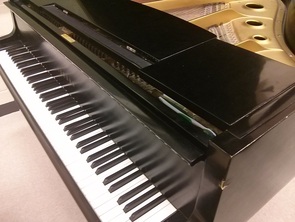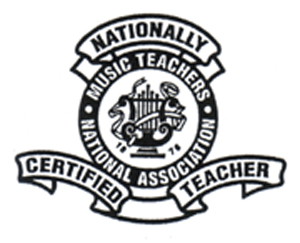 Take a quick peak at the photo on the left. This is the piano that advanced young pianists used at today's NFMC Junior Festival at UMBC. Notice anything odd? Look under the music stand, in the corner closest to the camera. See it now? The white and green... toothbrush????!!! Yep - that's a real toothbrush that was found by one of the festival participants (there was a pencil right by it, too). Though the toothbrush didn't impact the sound of the piano (it would be an interesting prepared piano effect if it were on the strings) it did serve as a good indicator that this instrument is not particularly well-loved. [Sometimes I want to start a new organization: The Society for the Prevention of Cruelty to Pianos] Indeed, students were challenged by this beast of an instrument: from the bass notes not sustaining with the damper or sostenuto pedals, to the una chorda pedal creating intense dissonances and rattles, to an uneven sound quality across the keyboard. Yikes. A problem piano? Definitely. A fluke? Maybe (the recital hall piano was unexpectedly locked... and no one could be reached to come open it). A day in the life of a pianist? Yep. Unlike other musicians, pianists don't get to take their own (or their teacher's) instruments with them for performances. That means we at the mercy of whatever is provided (don't remind me about the times that the concert organizers "didn't realize" I need a piano, or time the TV producer assured me that I can play without pedals for a televised performance with orchestra). Sometimes we luck out and get a beautiful instrument that is easy to play. Other times, we have to work MUCH harder to create an effective performance. Do we give up when we get a piano that isn't up to our normal standards? No! I liken our challenge to the process of a chemist analyzing a water sample: we must evaluate the instrument's strengths and weaknesses quickly (sometimes instantaneously, if we don't have a chance to try out the instrument before diving into the performance) and create a plan of action to make it sound as best as it possibly can. I have witnessed many a fine pianist turn a "bad" piano into a beautifully singing instrument through their expert voicing, determined expression, and careful avoidance of the piano's weaknesses. Thus, I believe whole-heartedly that it can be done. It's not easy... but we need to be ready to step it up a notch when the time calls for it. This challenge can be:
Dr. Stephanie Bruning said that "flexibility is a good middle name for a pianist." I agree! The audience has sympathy for the plight of the performer, however in the end, all they want is a beautiful performance, and it's your job to make it happen.
0 Comments
Leave a Reply. |
AboutElizabeth Borowsky is a pianist, teacher, and composer. She is a Nationally Certified Teacher of Music in Piano (Music Teachers National Association). SubscribeCategories
All
Archives
May 2023
|
Location |
|



 RSS Feed
RSS Feed